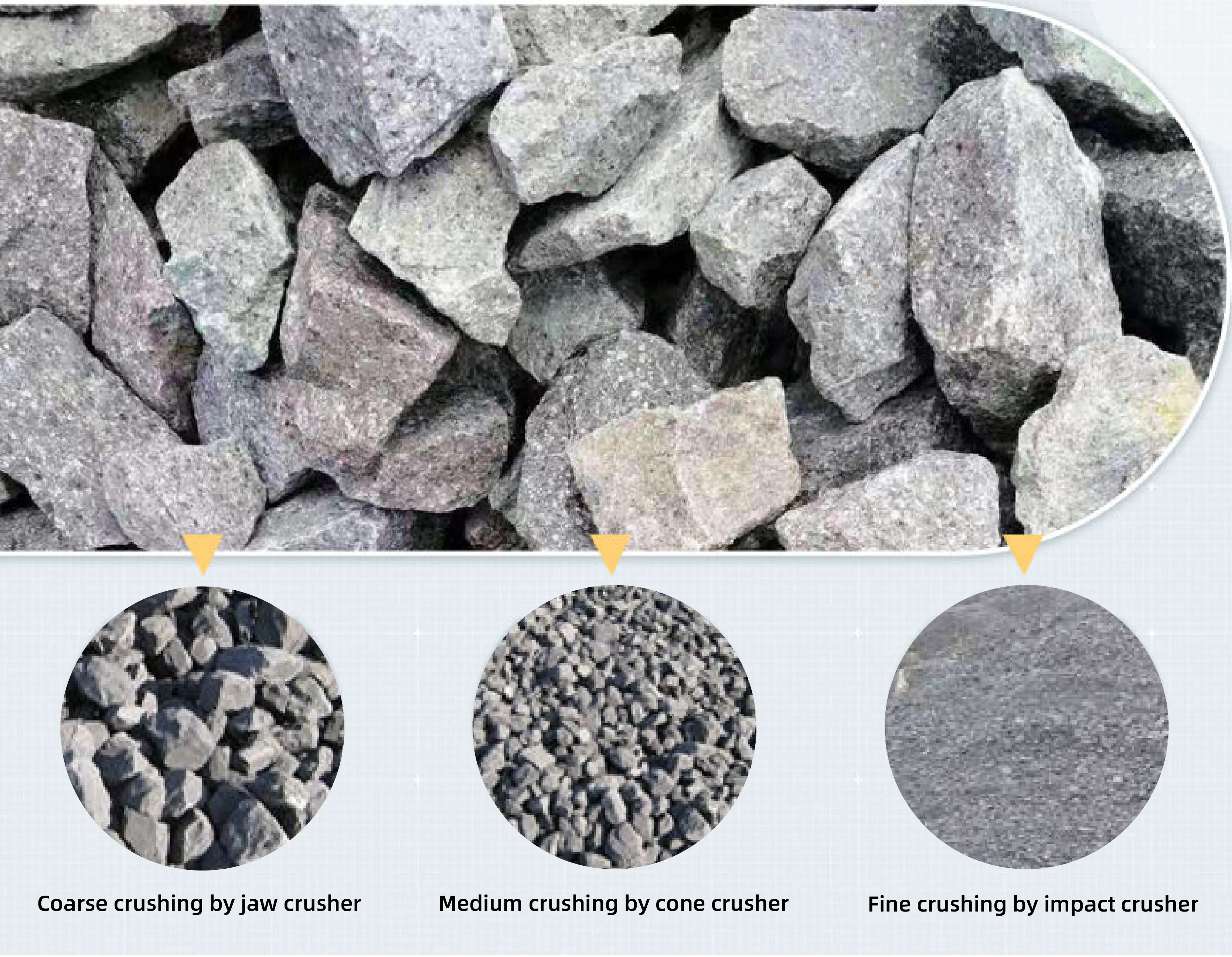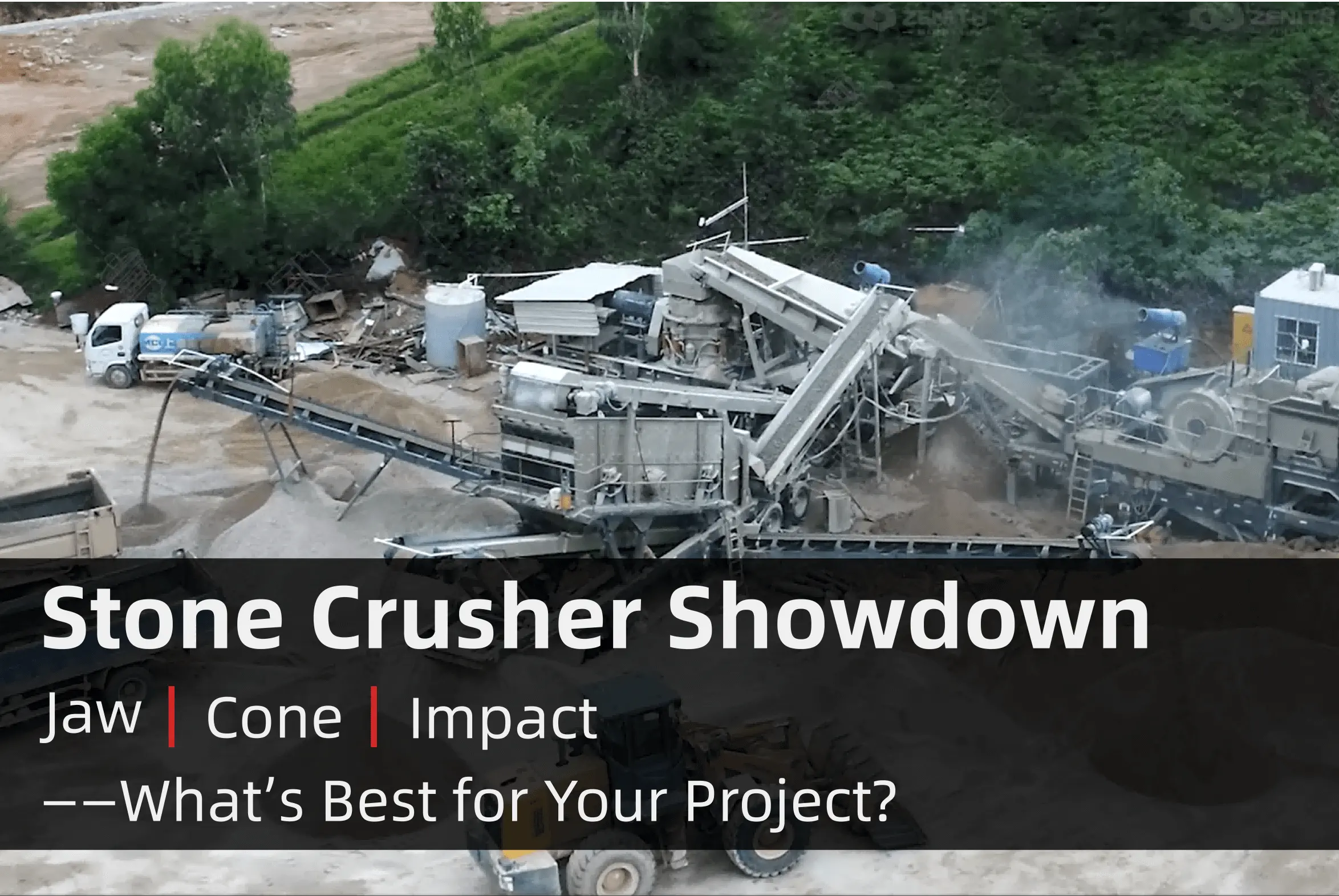Stone Crusher Plant Types: Jaw, Cone & Impact Crushers Compared
May 15, 2025
When planning to set up a stone crusher plant or invest in a mobile stone crusher plant, the
biggest question you’ll face is: which type of stone crusher should you choose? Among the
most common crushers are jaw crushers, cone crushers, and impact crushers. Each has unique
features, strengths, and suitable use cases. This article helps you understand the key
differences to make a confident decision for your project.
Stone Crusher Working Principles & Structural Design
Let’s start with how these crushers actually work:
- Jaw Crusher: This machine works by squeezing stones between a moving jaw and a fixed
jaw. These jaws form a V-shaped chamber. The stone gets crushed as the moving jaw
presses it against the fixed one. This simple but powerful mechanism makes jaw crushers
ideal for tough materials.
- Cone Crusher: Inside a cone crusher, there's a spinning cone mounted on an eccentric
shaft. The stone is crushed as it's compressed between the mantle (the cone) and the
concave bowl. Cone crushers use a layered crushing process and can adjust the discharge
size using a hydraulic system.
- Impact Crusher: An impact crusher uses a high-speed rotor to throw stones against a hard
impact plate. This repeated collision breaks down the material. The angle of impact and
rotor speed can be adjusted to fine-tune the final product.
Material Suitability & Product Characteristics

Different stone crushers handle different materials better:
- Jaw Crusher: Great for granite, basalt, and other very hard materials. Not so good for
sticky or wet materials, since they can clog the crushing chamber. The final product is
usually coarse with a mix of flat or elongated shapes. Ideal for primary crushing in
large-scale mining or demolition projects.
- Cone Crusher: Best for medium to hard stones like river rock or volcanic rock. If your
material contains a lot of mud or fine particles, cone crushers may struggle due to
potential clogging. However, the crushed stones are well-shaped and evenly sized, making
them perfect for high-quality concrete or asphalt use.
- Impact Crusher: Suitable for softer materials such as limestone and sandstone. It
struggles with very hard rocks like quartzite, which can wear down parts quickly. But if
you want well-rounded, uniform gravel—especially for asphalt mixes or manufactured
sand—impact crushers are your go-to.
Capacity and Energy Efficiency of Stone Crusher
Here’s how the different crushers stack up in terms of capacity and power usage:
- Jaw Crusher: Delivers high output per horsepower and can handle large feed sizes. A
great option if you're looking for simple, high-throughput crushing with low energy
bills.
- Cone Crusher: Slightly less productive per unit of power than jaw crushers, but they
shine in secondary or tertiary crushing. Their steady performance and adjustable
settings make them good for quality-focused applications.
- Impact Crusher: While it may consume more power, it produces better-shaped material and
is effective when you need consistent gradation. Just be cautious about energy costs
with very hard stones.
- Note: Moisture levels and clay content in the stone can reduce capacity across all
machines, but impact crushers tend to suffer the most under wet conditions.
Cost Analysis & Maintenance of Stone Crusher
Let's talk money and upkeep:
- Jaw Crusher: These have a relatively low upfront cost and are easy to maintain. However,
the jaw plates wear out and may need replacement more often—especially under heavy-duty
operations.
- Cone Crusher: Higher initial investment due to the complexity of the machine. But the
wear parts like liners last longer, and the output quality may justify the cost. The
hydraulic system adds maintenance steps, especially if operating in remote or dusty
conditions.
- Impact Crusher: Moderate cost, but the wear parts—like blow bars and screen plates—can
wear out quickly, depending on the rock. The upside is that these parts are usually easy
to swap, keeping downtime to a minimum.
System Integration in Stone Crusher Plants

Stone crusher plants can be built in fixed or mobile setups:
Fixed Setup: A common configuration is starting with a jaw crusher for rough breaking, then
using a cone crusher for secondary crushing, and finally an impact crusher or vertical shaft
impact crusher for producing fine sand or well-shaped gravel.
Mobile Stone Crusher Plant: These combine one or more crushers with mobile chassis and
conveyor belts. For example, a jaw crusher mobile plant can be paired with an impact crusher
unit for a highly flexible, all-in-one solution. Ideal for on-site demolition or quarry
operations with changing locations.
In both systems, using a closed-loop layout—where material is recirculated through the
system—can help control the shape and consistency of the final output.
Future Trends & Stone Crusher Selection Guidelines
Crushing technology is moving fast. Here are some trends and practical tips:
Smart Automation: New models now come with auto-adjustment features that change discharge
settings or protect against metal overloads, reducing manual work.
Smart Automation: New models now come with auto-adjustment features that change discharge
settings or protect against metal overloads, reducing manual work.
Choosing the Right Crusher:
Start with your material: Is it hard, soft, wet, or sticky?
Define your end use: Is the stone for road base, asphalt mix, or sand?
Estimate your capacity needs: How much material per hour?
Check your budget: Can you afford advanced systems, or do you need something simple and
durable?
Choosing the right stone crusher is not a one-size-fits-all decision. By understanding how
each crusher type works and what they are best suited for, you can tailor your stone crusher
plant—whether fixed or mobile stone crusher plant—to meet your project’s needs. In most
operations, using two or even three types in sequence is often the best solution. Think
long-term, weigh the trade-offs, and pick the machine that balances performance, cost, and
durability.
If you're still unsure, talk to a crushing equipment expert. The right guidance today could
save you months of trial-and-error tomorrow.


